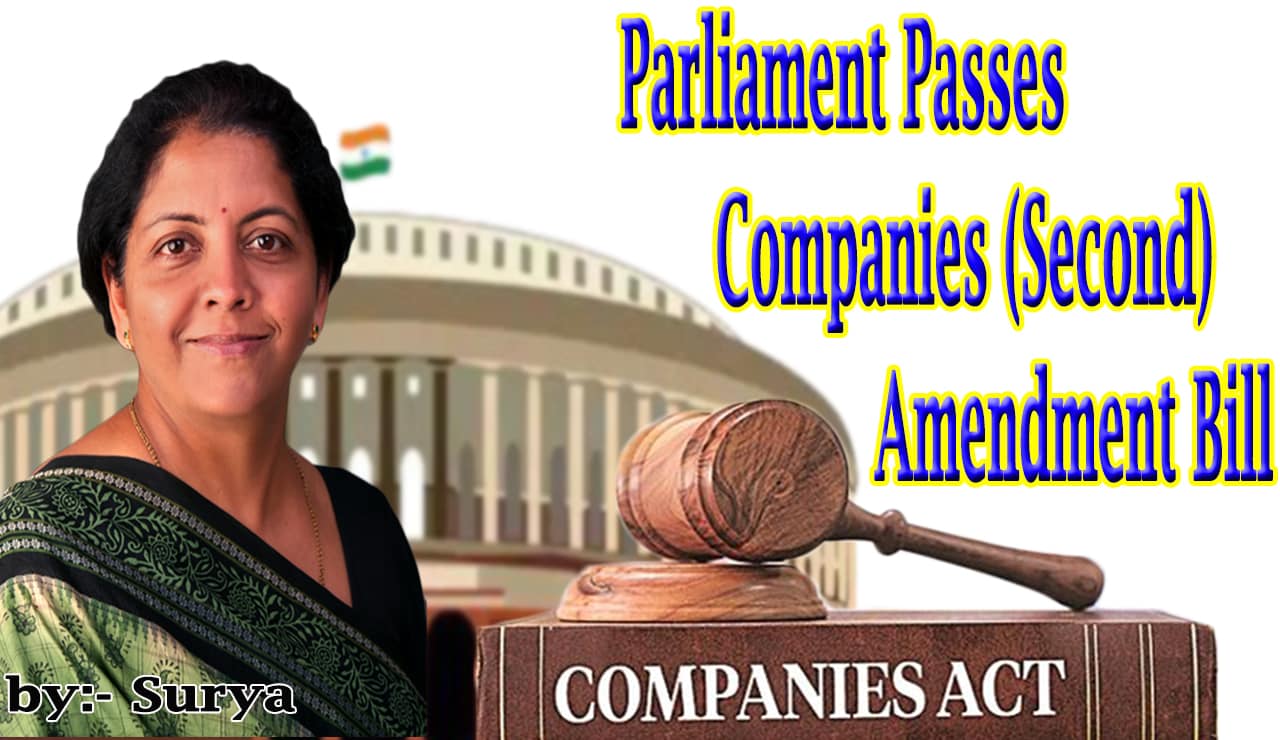Table of Contents
- Brief Overview
- Motive Behind the Act
- First amendment
- Changes in CSR
- Second Amendment
Brief Overview
The Companies (Second Amendment) Bill, to amend the Companies Act, 2013 was Approved by The Union Cabinet on March 4, 2020.
Previously the Act was amended on July 30th 2019.
The amendment has a total of 72 changes in its 65 sections
The focuses of these changes are decriminalization of various provisions Act i.e. to lessen of criminal penalties in relation to certain sections, and to permit direct overseas listing of Indian corporates.
Motive Behind the Act:
In November, a government-appointed high level panel proposed decriminalising more than half of the existing compoundable offences under the companies’ law, as well as lower monetary penalties for violations by startups, to further improve the ease of doing business in the country.
In accordance with the panel, Improving the conditions and regulations to improve ease of doing business was cited as the main motive behind the amendment
Companies (Amendment) Bill (July 2019)
Changes in the act after (July 30th 2019) amendment
– Issuance of dematerialised shares: Under the Act, certain classes of public companies are required to issue shares in dematerialised form only. The Bill states this may be prescribed for other classes of unlisted companies as well.
– Beneficial ownership: If a person holds beneficial interest of at least 25% shares in a company or exercises significant influence or control over the company, he is required to make a declaration of his interest.
The Bill requires every company to take steps to identify an individual who is a significant beneficial owner and require their compliance under the Act.
– Re-categorisation of certain Offences:
The 2013 Act contains – 81 compoundable offences punishable with fine or imprisonment, or both. These offences are heard by courts.
(Compoundable offences are those offences where, the complainant (one who has filed the case), enter into a compromise, and agrees to have the charges dropped against the accused)
The Bill re-categorizes 16 of these offences as civil defaults, where adjudicating officers (appointed by the central government) may now levy financial penalties instead.
These offences include:
(i) Issuance of shares at a discount, and
(ii) Failure to file annual return.
Further, the Bill amends the penalties for some other offences.
– Changes in Corporate Social Responsibility (CSR):
Under the Act, if companies which have to provide for CSR, do not fully spend the funds, they must disclose the reasons for non-spending in their annual report.
- Under the Bill, any unspent annual CSR funds must be transferred to one of the funds under Schedule 7 of the Act (e.g., PM Relief Fund) within six months of the financial year.
- However, if the CSR funds are committed to certain ongoing projects, then the unspent funds will have to be transferred to an Unspent CSR Account within 30 days of the end of the FY, and spent within 3 years.
- Any funds remaining unspent after three years will have to be transferred to one of the funds under Schedule 7 of the Act.
– Compounding: Under the Act, a regional director can compound (settle) offences with a penalty of up to five lakh rupees.
The Bill increases this ceiling to INR 25 lakh.
– Bar on holding office: Under the Act, the central government or certain shareholders can apply to the NCLT (national company law tribunal) for relief against mismanagement of the affairs of the company.
The Bill states that in such a complaint, the government may also make a case against an officer of the company on the ground that he is not fit to hold office in the company, for reasons such as fraud or negligence.
If the NCLT passes an order against the officer, he will not be eligible to hold office in any company for five years.
Key Changes after (Second) Amendment (March 4, 2020):
66 compoundable offences to be changed under the Companies Act:
Out of 66 compoundable offences under the Act,
- 23 will be recategorised
- 7 have been omitted altogether
- 11 will have limited punishment in the form of fines alone by removing imprisonment provision
- 5 will be dealt with different alternative frameworks,
- 6 which had earlier been decriminalized will now have reduced quantum of penalties.
- Also, monetary penalties lowered for violations by startups.
-There are 52 proposals that would result in 48 amendments for greater ease of doing business for law abiding corporates by way of removing criminality totally in respect of 35 procedural and technical defaults.
Other changes brought by the Amendment-
- Amendment would be carried in Section 23 of the Act to allow direct listing of securities by Indian public companies in permissible foreign jurisdictions.
- Relaxation in corporate social responsibility (CSR) compliance requirements as companies which have an obligation to spend 50 lakhs INR per annum or less on CSR are no longer required to have a CSR committee.
- Companies which spend over the obligated 2% on CSR in a particular year can carry it forward as credit for fulfilment of CSR obligations for the next few years.
- It also proposed creation of separate Benches at the National Company Law Appellate Tribunal (NCLAT).





